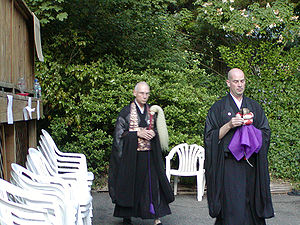
Jisha
Encyclopedia
For the article about temple-shrines ' onMouseout='HidePop("16917")' href="/topics/Chinjusha">Chinjusha
.
 , along with the titles inji and sannō, are Japanese
, along with the titles inji and sannō, are Japanese
terms used in reference to the personal attendant of a monastery's abbot or teacher in Zen Buddhism. In the Rinzai school, the term is usually either inji or sannō. According to the book 3 Bowls: Vegetarian Recipes from an American Zen Buddhist Monastery, "While the jikijitsu
is the stern father of the zendo
, the jisha is the den mother, balancing the strictness that his counterpoint establishes. The jisha prepares for and greets all guests, tends to the needs of the students, takes care of the sick, and organizes the cleaning of the monastery." According to author Victor Sōgen Hori, "In the Northern Sung period, a master of a large monastery had two attendants, but by the Yüan period the number of attendants had increased to five: an incense attendant, a secretary attendant, a guest attendant, a robe attendant, and a 'hot water and medicine' attendant who cooked for him."
Chinjusha
In Japanese is a Shinto shrine which enshrines a , that is a spirit protecting a given area, village, building or Buddhist temple. The Imperial Palace has its own tutelary shrine dedicated to the 21 guardian gods of Ise Shrine. Tutelary shrines are usually very small, but can sometimes be very...
.

Japanese language
is a language spoken by over 130 million people in Japan and in Japanese emigrant communities. It is a member of the Japonic language family, which has a number of proposed relationships with other languages, none of which has gained wide acceptance among historical linguists .Japanese is an...
terms used in reference to the personal attendant of a monastery's abbot or teacher in Zen Buddhism. In the Rinzai school, the term is usually either inji or sannō. According to the book 3 Bowls: Vegetarian Recipes from an American Zen Buddhist Monastery, "While the jikijitsu
Jikijitsu
A is the individual in charge of directing monks to the zendo to sit zazen in a Japanese Zen monastery. Their position is that of head monk, and they are generally regarded as strict disciplinarians. Their position is considered most desirable to hold in the meditation hall. The jikijitsu also...
is the stern father of the zendo
Zendo
or is a Japanese term translating roughly as "meditation hall". In Zen Buddhism, the zen-dō is a spiritual dōjō where zazen is practiced...
, the jisha is the den mother, balancing the strictness that his counterpoint establishes. The jisha prepares for and greets all guests, tends to the needs of the students, takes care of the sick, and organizes the cleaning of the monastery." According to author Victor Sōgen Hori, "In the Northern Sung period, a master of a large monastery had two attendants, but by the Yüan period the number of attendants had increased to five: an incense attendant, a secretary attendant, a guest attendant, a robe attendant, and a 'hot water and medicine' attendant who cooked for him."

